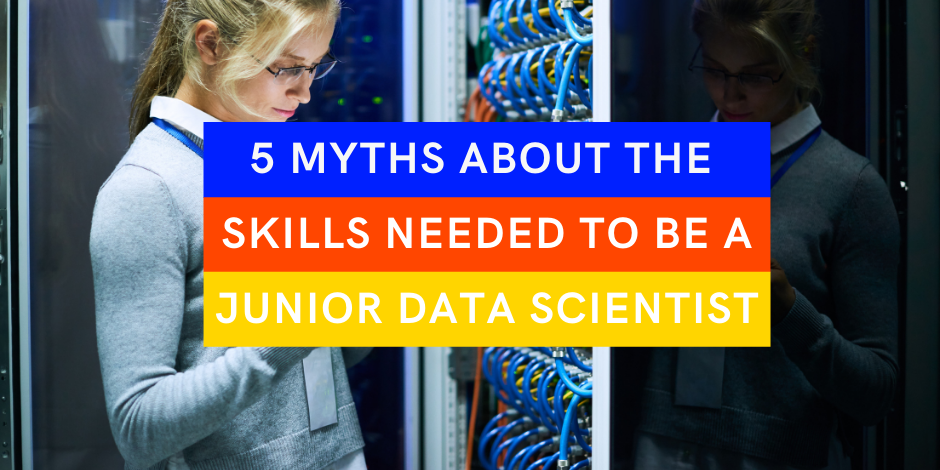5 myths about the skills needed to become a junior data scientist

Stay Informed With Our Weekly Newsletter
Receive crucial updates on the ever-evolving landscape of technology and innovation.
There are many misconceptions about the skills required to become a junior data scientist. These fictions may deter people from joining the industry. However due to the current skills shortage, the industry needs people from diverse backgrounds who have a wide range of skills.
Here are the 5 myths about the top skills required to become a junior data scientist:
1. Data Science training is about building your skill set for data analysis and data processing
Data science training is about building a broad range of skills to understand data sets, find insights, discover patterns and make predictions for a business or organisation. Data science training builds on a number of different skills including:
- Data analysis and data processing to manipulate and analyse data sets
- Machine learning techniques to identify patterns and make predictions
- Domain expertise to understand the meaning behind the data and predictions
- Communication and reporting to explain concepts to a non-technical audience
You may have already been trained in some of the required skills for a data scientist role such as communication and your domain expertise. Every industry is currently going through a Big Data Revolution and businesses are trying to keep up. Businesses are demanding data professionals with domain expertise from diverse backgrounds to make sense of and extract value from large data sets.
Here’s an easy checklist of relevant skills required for Data Science to add to your resume:
- Domain expertise
- Data science technology
- Data science techniques
- Knowledge of visualisations
- Knowledge of programming technologies (SQL, Python, R etc.)
- Communication and report writing
- Business consulting
2. Data Science training has high prerequisites and can only be taught to IT professionals
Data science training does not have a defined set of prerequisites. You can come from an IT or non-IT background to become a data scientist. Junior data scientists are required to code but this can quickly and easily be learned before any formal data science training. Also, trainee or junior level data scientists have lower prerequisite coding skills than experienced candidates.
You can start learning to code in Python, R and SQL which are the main coding languages in data science. Online resources are generally very engaging with videos, quizzes and games. If you are a non-IT professional, you should expect to take around 40 hours to pick up the basics of Python and SQL before starting your formal data science training.
3. Mathematics training on your resume is a prerequisite for a career in Big Data
There’s a broad range of roles in data science and not all of the roles require mathematics. Many roles which focus on discovery, descriptive analytics and data engineering do not require a mathematics background.
Mathematics training is one of many possible backgrounds for a career in big data. You may come from a number of other backgrounds to fulfil the prerequisites.
Other training backgrounds that can serve as a prerequisite for a career in big data:
- Business
- Consulting
- IT
- Science
- Engineering
Furthermore, data science training includes mathematics as part of its curriculum in topics such as python for statistics, data analysis and machine learning techniques.
4. The technology required for statistical analysis is expensive and only available to enterprises
Data science technology is rapidly advancing as the field emerges and grows. This has led to the development of a number of open source technologies and libraries. This started back in 1993 with the creation of the R Project by professors at University of Auckland, New Zealand. In recent years, Python has taken over as one of the industry favourites for open source statistical technology.
Here is a list of commonly used open-source data technology in the industry:
- R
- Python
- SQL
- Hadoop
- Spark
You can now download almost all of this software for free and there are vast libraries of content to support users. Also, you don’t need expensive hardware or physical computers for data science because of recent mainstream access to public cloud computing. This includes Amazon Web Services and Microsoft Azure, which can be used for data processing at a very low cost.
The growth of the analytics industry has led to data technology for data science and statistics becoming available to businesses and professionals at a very low or no cost.
5. PHDs have the right requirements for the data science skills shortage
You may have the impression that only PhDs are qualified for junior data scientist roles. However, PhDs have an extremely deep knowledge in one particular area, whereas data scientists require broader practical skills for the role.
PhDs often have extensive theoretical knowledge which may not be useful for every role. We often hear stories of hiring managers who realise, after recruiting a PhD graduate, that the PhD graduate is unable to complete the required work for the role. These PhDs can become excellent data scientists; however, they often need to broaden their skill set and learn further practical skills required for the role.
Everyone can learn – or already has – the top skills required to become a junior data scientist.
Many people are misinformed about the top skills required for a junior data scientist role. You may have already developed some of top skills for a career in big data without even realising it. The remaining skills can be taught easily to motivated IT or non-IT professionals. The industry is currently demanding people to join with different domain expertise and experiences for the skills future and shortage of supply of data professionals.
If you are interested to learn more about up-skilling and landing a job in the Data Science & AI industry, you can book a consultation with a Big Data Career Consultant.

